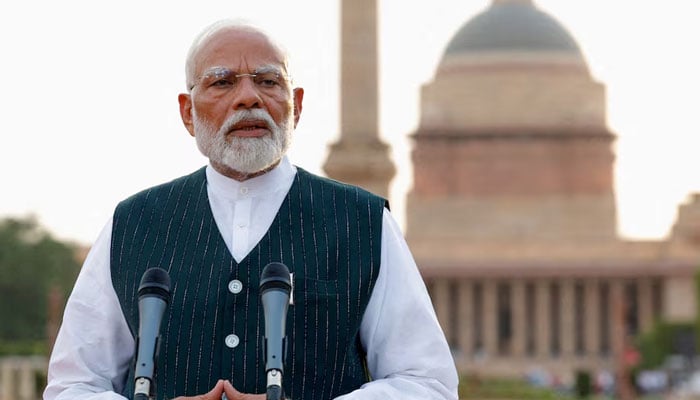The 'end of India'
Today, Indian state appears driven not by quiet wisdom of statesmanship, but by roaring machinery of polarisation
June 06, 2025

In 2003, the legendary Indian writer Khushwant Singh published a small but searing book titled The End of India. In it, he issued a bleak warning: that India, if it continued down the path of communal hatred and state-sponsored violence against minorities, would unravel from within. Singh, a staunch secularist and survivor of Partition's carnage, feared that the dream of a pluralistic India was already dying.
Two decades later, his prophecy feels less like a warning and more like an obituary. The recent conflict between India and Pakistan did more than reignite an old geopolitical fault line. It laid bare the erosion of India’s democratic soul and the burial of the secular promise envisioned by Gandhi, Nehru, Azad and Ambedkar.
What transpired before, during, and after this crisis was not just a diplomatic misstep. It was the full-throated betrayal of the republic’s founding ideals: pluralism, nonviolence, federalism and constitutional morality.
Today, the Indian state appears driven not by the quiet wisdom of statesmanship, but by the roaring machinery of polarisation. Populism now sits on the throne where principle once resided. Propaganda has replaced press freedom. Performative patriotism has choked out moral courage.
In moments of national peril, statesmanship is supposed to rise and call for restraint. Instead, India's political leadership chose to orchestrate a spectacle. There were no emergency parliamentary debates, no national reconciliatory addresses, no appeals to Gandhi's spirit. What emerged was a concert of vengeance: hashtags masquerading as policy, studio debates as diplomacy and chest-thumping as statecraft.
Rather than calming a frightened population, political leaders played to the coarsest instincts of their base, the line between diplomacy and demagoguery vanishing in a fog of militaristic fervour. But perhaps the most disheartening collapse occurred not in the chambers of power, but in the newsrooms of the so-called "world's largest democracy".
Where was India’s Fourth Estate? In place of sober analysis and investigative courage, we found war-mongering and fiction. Major television channels turned into cheering squads, parading doctored videos and unverifiable claims of military conquest. Critical voices were branded ‘anti-national’, dissent disappeared from screens and truth became a casualty of nationalism.
This was not journalism. This was theatre – of compliance, fear, moral bankruptcy. This failure is existential. For when journalism becomes indistinguishable from propaganda, democracy itself begins to die. India, once the noisy, pluralistic mosaic of debate, has now become a monoculture of fear, where minorities whisper, dissenters vanish and majoritarianism masquerades as unity.
The Indian republic was always an audacious experiment — a home to every religion, language and caste. It did not deny its contradictions, but it promised to live with them. Today, that promise lies in ruins. In the wake of this conflict, a wave of targeted hatred swept across the land. Mosques were vandalised. Christians accused of "forced conversions" were dragged through the streets. Sikhs were smeared for their political beliefs. Dalits, as always, bore the brunt of institutionalised brutality. The India that Ambedkar envisioned is now a state that appears to weaponise identity.
The legal landscape, too, has turned sinister. Laws like the Citizenship Amendment Act (CAA), the revocation of Article 370, and the rampant misuse of anti-terror legislation signal not isolated events but a sustained campaign to redefine Indian citizenship along religious lines. This is not nation-building. It is nation-fracturing.
And while India lost its moral compass in a sea of spectacle, something remarkable happened across the border. Pakistan — historically known for its impulsiveness — exhibited a rare display of restraint. Its leadership, for once, kept a calm tone. The prime minister's statements emphasised diplomacy over dominance. The Foreign Office remained measured. Pakistani civil society, media, and analysts engaged with nuance. There were debates — even criticism — but without the thirst for blood.
This is not to exonerate Pakistan’s past sins. Far from it. But in this particular chapter of South Asian history, Islamabad, not New Delhi, appeared more statesmanlike.
This contrast was not lost on the world, nor will its consequences be. The global community, already wary of authoritarian drift, saw in India a democracy faltering under the weight of its own insecurities.
If India continues on this path, it risks something far graver than criticism: isolation and irrelevance. Because in the 21st century, no nation that marginalises its own can thrive. No economy can bloom in a society divided by hate. No army can defend a nation at war with its conscience.
What is unfolding is not just the death of Gandhi’s dream but the slow undoing of India’s global moral standing. Once a beacon of post-colonial possibility, India is now teetering on the edge of a dangerous transformation – from republic to regime, from promise to performance, from diversity to division.
There is still a choice. The path to redemption exists. It is not paved with slogans but with soul-searching. It requires a return to the constitutional promise, to secularism not as a slogan but as a lifeline. The citizens of India must now answer Khushwant Singh’s question: will India end not with a bang from its enemies, but with the silence of its conscience?
The Indus and the Ganges flow not only with water, but with memory — of unity, resistance and co-existence. May they once again carry with them the will to live together, not as Hindus or Muslims, but as people.
The writer is an expert on climate change and sustainable development and the founder of the Clifton Urban Forest. He posts @masoodlohar and can be reached at: [email protected]
Disclaimer: The viewpoints expressed in this piece are the writer's own and don't necessarily reflect Geo.tv's editorial policy.
Originally published in The News











